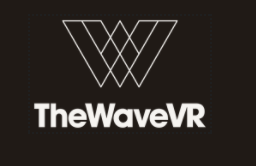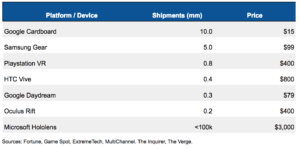WaveVR: The Future of Live Music

WaveVR has created a compelling app to experience live music in a virtual world.
Founded in 2016, WaveVR has quickly emerged as one of the leading VR startup companies focused on music. WaveVR has developed an app that allows users to experience an immersive music visualizer with virtual spaces to watch live DJ concerts. It takes traditional 2D music visualizers a couple of steps further, taking users through a musical “world” that is constructed around a musical experience. WaveVR has raised $6.5 million to date. The picture below displays what the visualizer app looks like.
The WaveVR app is in fact more than just a music visualizer, it also allows users to “host” their own concerts in proprietary spaces that they control within the virtual world. In these spaces, other users can attend a show that another user is “DJ-ing.” This use case is very compelling for DJ. The app is meant to be used with PC-tethered headsets like the HTC Vive or the Oculus headset.
Operating Model
WaveVR has developed deep VR technical design capabilities; the application has garnered much attention for being one of the most visually advanced VR applications in the market today. The team skews heavily on the creative side, with senior level professionals having specialties in both art and design. The company also has a bench of engineers, as the technology has been built in-house from the ground up. WaveVR has been focused until recently on shipping its first full (i.e. non beta) version of the app.
Value Creation
WaveVR’s current customers are consumers and DJs (who are also users). For consumers, the app creates value by providing an incredibly engaging and unique musical VR experience. So far, the app has seen strong engagement with its first users, largely because it is an experience is unprecedented and only possible in the medium of VR. The highly immersive experience hinges on concert performances, so the consumer feels as if they are in a live DJ performance, just in a virtual world. The app creates value for DJs by allowing them to connect with fans all over the world. DJs will also have the option to charge fans to attend their live performances in the WaveVR app.
In the near future, music labels and artists (independent and signed) will likely be customers as well. WaveVR has the potential to be an effective platform for music marketing and music discovery, and music labels are willing to pay top dollar to market their superstar artists. This marketing could take the form of in app advertisements, live virtual shows by the artists that labels want to market, or campaigns with the most popular DJs in the app (i.e., having the DJs directly promote music in their live shows).
Given that WaveVR provides such a unique and engaging VR experience that is deeply musical, the value proposition is very strong for consumers, DJs, labels, and artists. The application also has strong same side network effects (on the consumer side) and strong indirect network effects (consumer->DJ).
Value Capture
The VR installed base is relatively small to date. As seen in the chart below there have been less than 7 million PC-tethered headsets sold (excludes Google Cardboard and Daydream).

Attracting this small base of users to your content is difficult and likely requires user subsidy. As such, WaveVR has made its application free for users to date. Monetization will likely start on the DJ side, charging DJs a fee to have their own virtual space in which to play a live DJ set. Later down the line, the company expects to allow DJs to charge users that are watching their shows (a virtual ticket sale), and WaveVR may take a commission fee out of the ticket price. In the longer term, the company is likely to run marketing campaigns for the major music labels within the app and charge them for this service.
Considerations
VR is still a very nascent space, and it’s unclear which platforms and devices consumers will adopt en masse. However, one strong industry trend is the growth of the mobile VR segment. Further, most in the industry believe that mobile will be the primary consumption method for VR content. With this in mind, WaveVR needs to develop a mobile-ready app as soon as possible. This may require creating a lite version of the app that uses less complex graphics, as mobile VR devices do not currently have the image processing capabilities that PC-tethered ones do.
Sources
- https://www.crunchbase.com/organization/thewave#/entity
- http://thewavevr.com/
- https://www.texastechpulse.com/interview_with_adam_arrigo_the_wave_vr/s-0066659.html
- https://techcrunch.com/2016/08/05/thewavevr-raises-2-5m-from-kpcb-and-others-to-bring-the-concert-experience-into-vr/




Hi Alex,
A very interesting blogpost. Sorry, my comment section had a problem earlier, so I couldn’t post. Do you think traditional nightclubs are in trouble as this would give instant boost to in-house parties that anyone could replicate at low cost. Do you rate WaveVR app as a low-end disruption to nightclub activities.